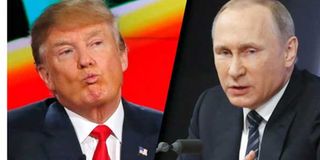Who loses the most in US-Russia sanctions fight: Q&A

What you need to know:
Those unhappy with the round of penalties enacted in Washington include not only Russian President Vladimir Putin and Russian legislators but the European Union and even US President Donald Trump, who nonetheless signed the sanctions into law.
Washington. Outside the US Congress, which pushed the issue, there was little celebration of the latest escalation of sanctions between the US and Russia.
Those unhappy with the round of penalties enacted in Washington include not only Russian President Vladimir Putin and Russian legislators but the European Union and even US President Donald Trump, who nonetheless signed the sanctions into law.
There are signs that the law will have a limited effect on its intended target but could cause collateral damage.
1. Wasn’t Russia already under US sanctions?
Yes, and the new law doesn’t dramatically expand the sanctions imposed under Trump’s predecessor, Barack Obama, starting in 2014 after Russia annexed the Ukrainian peninsula of Crimea. The biggest change is that those sanctions are now codified into a law specifying that any move by Trump (or a future president) to loosen the penalties could be blocked by Congress, where suspicion of Russia runs high. Russian Prime Minister Dmitry Medvedev said this means the sanctions "will remain in effect for decades unless a miracle happens."
2. Who is the target?
It’s still primarily Russian officials and business figures who were sanctioned in the past with asset freezes and visa bans for their alleged roles in the Ukraine crisis and, later, the civil war in Syria. Also Russian state banks and companies, which are barred from getting financing through US banks and markets, as well as Russian oil and gas companies. The new law tightens some of those limits a bit -- for instance, US companies now can’t participate in any energy project in which Russian entities have a stake of 33 per cent or more -- and allows the president to widen the sweep of sanctions to other industries, which Trump isn’t likely to do. Gazprom PJSC, the Kremlin-backed energy giant, lost value after it became clear Trump would sign the latest sanctions measure.
3. What’s the impact on the Russian economy?
Less than dramatic, from all appearances. Restrictions on Russian access to Western financing and technology could put a cap on the country’s already lackluster growth prospects as it emerges from the longest recession this century. And Russian markets took a hit for several weeks as the sanctions bill made its way through the US Congress. But Russian bonds, stocks and the ruble all strengthened after Trump signed the sanctions legislation. That suggests the impact is “likely to be limited” and has already been discounted, while damage to sentiment should gradually dissipate, HSBC analysts led by John Lomax said in an emailed note.
4. How does this affect the EU?
It could suffer collateral damage. The sanctions ban improvements, including repair, of Russian-owned pipelines into Europe. That provision could curb investment in the European- and Russian-financed project Nord Stream 2, a pipeline that would let Gazprom divert fuel flowing to the EU via Ukraine into a less controversial route under the Baltic Sea, to Germany. The US has always been opposed to Nord Stream 2, which it views as Russia’s attempt to solidify its hold on Europe’s energy supply. At least four other European energy projects could be undermined by the sanctions, according to a list compiled by the European Commission and seen by Bloomberg News. They are Nord Stream 1; the Blue Stream gas pipeline from Russia to Turkey involving Eni SpA; the Caspian Pipeline Consortium to carry Kazakh oil to the Black Sea via Russia; and a prospective Baltic liquefied natural-gas plant.
5. Was disrupting Russian energy to Europe a goal of the US?
That’s what some in the EU are charging. They allege that the U.S. wants to displace Russia as a gas supplier to Europe. But that’s a stretch. Russia produces gas far cheaper, doesn’t have to convert it to liquid form to ship it and already has a network of working export pipelines, even without Nord Stream 2. Gazprom has also said it has other methods of financing infrastructure if interest from Europe dries up.
6. Where else is collateral damage being felt?
Consider the US diplomats who have been sent packing. Putin, on July 30, ordered the US to cut its embassy and consulate staff in Russia by 755 -- belated retaliation for the expulsion of 35 Russian diplomats by former President Obama. The Russian leader didn’t explain how many of those 755 would be Russian workers. The Associated Press reported that about 400 American diplomats or other US officials are thought to be working in Russia, plus family members accompanying them on diplomatic passports.
7. Why is Trump not happy?
In signing the sanctions law (which also targets Iran and North Korea), he said it encroaches on presidential authority, may hurt the ability of the US to work with allies and could have unintended consequences for American companies. He’s also no doubt stung at a prime motivation of Congress -- to limit his ability to ease penalties on Russia while the Federal Bureau of Investigation is examining whether anyone close to him colluded with Russia’s interference in the 2016 presidential campaign. US intelligence agencies have concluded that Russia meddled to hurt Democratic candidate Hillary Clinton and ultimately to help Trump win. (Bloomberg)




